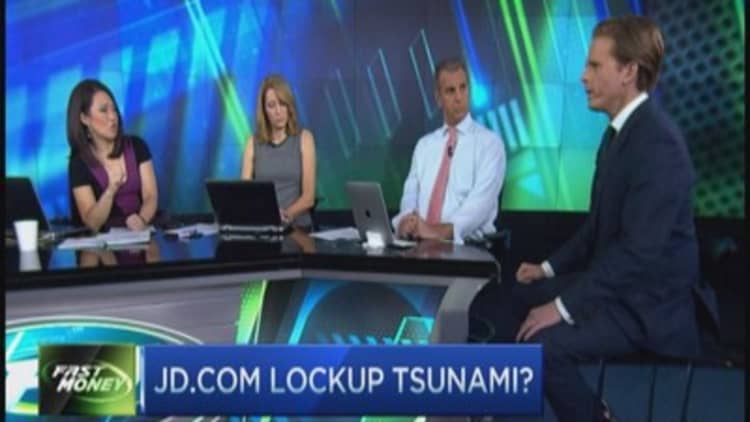
There's more where that came from—such a warning label should be slapped on shares of some companies that recently listed in the U.S.
In a potential attempt to keep supply limited—and share prices firm—certain Chinese companies have chosen to issue a very small percentage of their outstanding stock to the public. The average float for the 12 Chinese IPOs listed in the U.S. so far this year is 14.3 percent, versus an average of 31 percent for all new issues, according to Dealogic.
One salient example is e-commerce company JD.com, which raised $2 billion in a late May IPO. A mere 7.8 percent of outstanding shares were sold in the IPO—the seventh-smallest percentage of 264 U.S. listings so far this year, Dealogic said.
The trouble is that JD's share float may soon get much, much bigger. While some of the company's early investors sold shares in the IPO, they continue to hold the vast majority of their original stakes. JD declined to comment.
Those investors are bound by a so-called lockup agreement that prevents them from selling their shares for 180 days after the IPO, or sometime next week. Incidentally, JD will report its third-quarter earnings on Nov. 17, which triggers another 18-day wait on the lockup. Assuming the company has no other material news events, the lockup should expire on or around Dec. 5.
Read MoreWaiting for Alibaba IPO? Beware this substitute
Some 620 million shares are held between six early investors: Tiger Global Management, Russian venture capitalist Yuri Milner's DST Global, U.S. venture capital firm Sequoia Capital, along with Chinese investment firms Hillhouse Capital, Capital Today and Bull Capital Partners. Tiger Global and Sequoia declined to comment and the other firms didn't respond to requests for comment from CNBC.
If all of those investors were to sell, the float would expand by sixfold: just 108 million shares were sold in the IPO. The company's total share count is around 1.4 billion, according to UBS. The remaining locked-up shares held by JD management and strategic investor Tencent will also be released eventually under different schedules.
Big lockup expirations can have a painful impact. Shares of Twitter dropped 18 percent on extremely heavy volume on May 6, the day its lockup expired. Groupon also fell hard the day its lockup expired in June 2012. Granted, lockups aren't always so painful. Facebook shares rose on the day of its largest lockup expiry, but that situation was unusual because the social network's shares were heavily shorted and near their lowest-ever levels.
It's hard to predict which early investors might sell and how much they would want to unload. But it appears that some of them have already achieved amazing returns.
Take Capital Today. According to an interview with founder Kathy Xu posted on the firm's website, Capital Today has made a hundredfold return on its initial investment. Xu also describes tough times in 2008, when JD was desperate for funding. At one point, JD was haggling with an investor over valuing the entire company at $30 million or $45 million, she says. The company's market capitalization today is $36 billion.
JD.com IPO is 15 times oversubscribed
For such an investor, it would be hard to justify holding on to the stock and waiting for more. As an equity-capital markets banker at a major Wall Street bank points out, many investors judge their performance on an annualized basis. For someone who is already up by such an order of magnitude, a stock would need to continue rising at an extraordinary pace to maintain the annualized rate of return.
Even investors who bought JD much later appear to be sitting on massive paper profits. Milner's DST, for instance, bought some of its stake in February 2013 for the equivalent of $7.81 per share, according to public filings. The stock now trades at about $27.
Given such large gains, it's hard to imagine the investors wanting to gamble on a publicly traded stock. And those firms that are essentially venture capital investors don't tend to hold on to public companies for long anyway.
There's another reason to be concerned about JD's share price if more stock hits the market. JD, which has large exposure to a low-margin direct sales business like Amazon's, doesn't earn any profit. Consensus estimates reflect negative $154 million of earnings before interest, taxes, depreciation and amortization in 2015. If the stock were to fall after new shares hit the market, it would be hard to point to any earnings metric for support.
Shares of JD have risen 40 percent from their IPO price of $19 in late June, while rival Alibaba has gained 69 percent from its September debut. While JD is already the laggard, its uphill battle may soon get even steeper.

